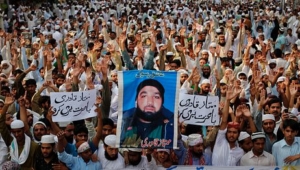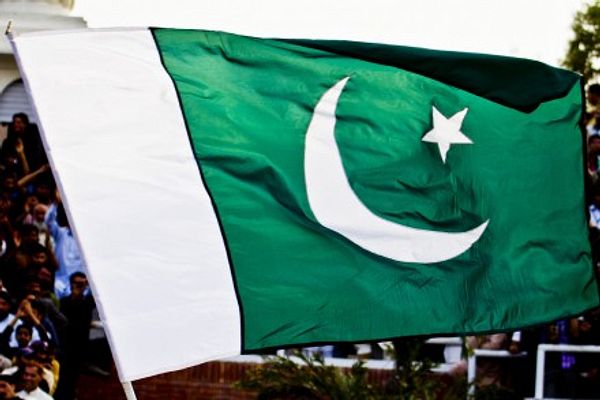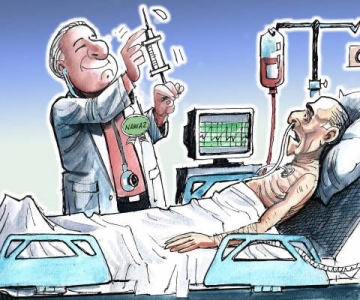Like so many others, I was recently targeted in a cold-blooded assassination for speaking out against extremism.
Pakistan has acquired a strong reputation of imprisoning a large number of men and women accused of blasphemy. Far from a fair trial, most of the accused are not even safe from mobs and vigilantes who assume the powers of both judge and jury. For a country that is ostensibly governed by a written constitution, this is extremely worrying. More so, when the state as an arbiter of human rights is silent, or even complicit in such human rights abuses.
The latest victim of the zealots ire is Mohammed Asghar, a 70-year-old man who also happens to be mentally ill. It is not surprising that there are some in Pakistan who want to see him dead. Asghar has been sentenced to death for blasphemy for various acts which, given his mental condition, he may not be aware of.
Asghar was formally sentenced to death in 2014. Despite his diagnosis in the U.K., of suffering from paranoid schizophrenia, the court chose to declare that he was competent to stand trial. However, late last month, a prison guard driven by self-styled zealotry burst into Asghar cell, and shot him in the back. The guard fired a second shot, narrowly missing. Restrained by others, the assailant nevertheless managed to get a good kick in as Asghar was taken to the hospital. Eyewitnesses have revealed that the guard chanted, Death to the blasphemer! as he swung his boot at the old man.
Asghar, I am told, is on the road to physical recovery. Nonetheless, I would not rate very highly his chances of surviving. Prison officials briefed the media that Asghar would return this week to the same prison where he was lynched and almost died. Also being held in the same prison is Zaffar Bhatti, a Christian pastor who has been on trial for blasphemy since 2012, and whose life is also in danger.
For me, all of this is rather personal. In March, I was targeted in a cold-blooded assassination attempt. My views on the persecution of minorities, and opposing the interpretations of Islam by extremists, were not acceptable to the armed militias; and they used violence to try and silence me. A few assassins shot at least a dozen bullets at my car. I was lucky enough to be able to duck under the car, where I lay motionless pretending I was dead. My driver, Mustafa, was not as lucky and was brutally killed in the attack. A human life was lost and another fellow traveler in the ambushed car was seriously injured. Asghar plight is mine too. Beyond the threat of violence, militants receive impunity for their crimes, and the state refuses to protect their victims. I was fortunate to survive but hundreds of Pakistanis have been targeted by ideologues, who think the world has to be purified of those who are infidels, blasphemers or their sympathizers.
The only thing necessary for evil to succeed in the world said a wiser person than me is for us to remain silent. For this reason, even though I do not know Mohammed Asghar, and I may never meet him, it would be wrong for me to remain silent today.
The government of Pakistan is running scared of extremists. There is good reason I am just one of several people whose deaths were meant to promote a skewed interpretation of Islam. In 2011, the world witnessed how Punjab Governor Salmaan Taseer was shot by his own guard for opposing the misuse of the blasphemy law. Other victims have been burnt alive. A Christian minister was gunned down later and another politician was hounded in the courts for having the gall to question the very questionable blasphemy laws on television! Earlier this year, a lawyer was killed for taking up the case of a bright young man languishing in jail due to allegations of blasphemy. Deaths in prisons have occurred with no accountability or punishment.

And yet, if politicians, policymakers, judges and lawyers tremble in fear, we may as well surrender our birthright to those who would deny us it. This culture of fear, orchestrated by powerful clerics and frenzied mobs, has paralyzed the criminal justice system. Those enjoying positions of power appear helpless. And there is no counter-narrative to oppose the spread of extremist ideology. At least three generations since the era of Pakistan Islamist dictator General Zia ul Haq rule (1977-1988) have been indoctrinated to accept violence in the name of religion as legitimate.
It is the duty of Pakistan parliament to put a stop to this madness. It should begin by initiating a debate about the growing number of blasphemy cases in the country, and how the legal provisions are being abused to settle personal scores. It is ironic that witch-hunting is carried out in the name of a faith that promotes peace and equality among human beings.
Pakistan is fighting an ideological battle against itself. It was created to safeguard the economic and political rights of the Muslim minority in 1947. In his first policy speech as the country founder, MA Jinnah assured Pakistanis that their state would not have a religious preference. But the course adopted by successive military and elected regimes betrayed Jinnah ideal. Over time the state has chosen to decide who is a Muslim and who is not; displayed an unequal acknowledgment of citizen rights, and enabled ungoverned spaces spelling chaos. Tackling the discriminatory laws may be the first step to restoring the kind of sane society we have a responsibility to bequeath to the next generation.
Mohammad Asghar, wounded at the hands of a state official, represents all that has gone wrong in Pakistan. It must be corrected immediately. Releasing an old, infirm person would be the right way to start what will be a long journey to saving Pakistan failing legal and social systems.



